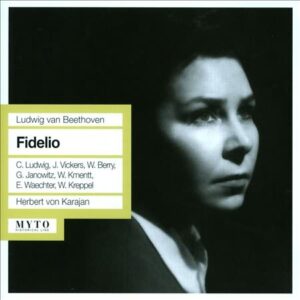Those of us who think of Herbert von Karajan as a conductor for whom nothing but icy perfection was acceptable will get quite a kick out of this performance of Fidelio from Vienna on May 25, 1962. It’s rather a mess. Apparently recorded from a position near the low strings and brass, and uncomfortably close to the timpani, it certainly gives you a visceral experience from the first forte notes of the overture–but it’s an unwelcome visceral experience, what with all the thumping drowning out the singers at times and the feeling that the room you’re in is going to start shaking. And if you get past that (turning down the bass helps but not with the voice/pit issues), there are other issues.
The year 1962 must have been one of Karajan’s speedy years. Despite some fine, sensible pacing–“Mir ist so wunderbar”; the opening of Act 2–it’s often a race to the finish. The overture is correctly manic-depressive, and the overlong, unnecessary Leonore Overture No. 3 is stunningly phrased for maximum effect, even if, as usual, it does make the transition to the opera’s final scene seem like Purgatory.
But Karajan is erratic, or this was under-rehearsed: Pizarro’s entrance–so overwhelmed by the brass and timpani–is so fast that Walter Berry’s pitch is all over the place and he can barely get his words out fast enough. And the first-act finale falls apart a couple of times. The “Er sterbe” quartet, certainly the opera’s emotional boiling point, boils over; the soloists’ attempt to sing precisely when they should falls into verbal and musical chaos before regaining its footing after “Tot erst sein Weib!”. And in “Namenlöse Freude” we can hear both Vickers and Ludwig working themselves to death to keep up, and on pitch, which they do. But as calculating as Karajan could be at times, this is just as hectic; it will keep you at the edge of your seat, but that’s not always the most comfortable position to be in.
Now to the positives. Gundula Janowitz is a lovely Marzelline, poised between girlhood and womanhood; her aria is lovely, and her voice glistens in ensembles. It’s hard to believe that her particular sound would be suitable for Leonore, which it was, just a few years later. Waldemar Kmentt is his usual professional, hard-working self, and his Jacquino rings true. Walter Kreppel’s Rocco is shorn of his gold aria (an odd Karajan decision), which always helps define this on-the-moral-ledge character; but his round, brown tone is fine and he’s particularly good in the dungeon scene.
Christa Ludwig is a thrilling Leonore. She had recorded the role under Klemperer earlier that year but Karajan is of an entirely different bent: while Klemperer breathed with her, Karajan bullies. It is a sign of her greatness that she gets through the last moments of “Abscheulischer” untarnished and with a solid high-B–but surely Karajan could have been less adversarial. On the whole, she’s more thoughtful, touching, and daring for Klemperer, but it’s interesting to hear her treated like a racehorse.
Jon Vickers is her partner with Klemperer, as he is here. He sounds strangely gravelly at times (he’s in smoother voice with Klemperer), but he’s no slouch here. He can do more with recitative in this opera than most Florestans can with the music. There are moments when he doesn’t quite sound like himself, but then, seconds later, that ferocity of attack returns. Perhaps he was indisposed, singing through a cold?
There’s no denying that this is an exciting show, but often in a startling, head-spinning manner. Stick with the Klemperer, still the winner, 50 years later.
































